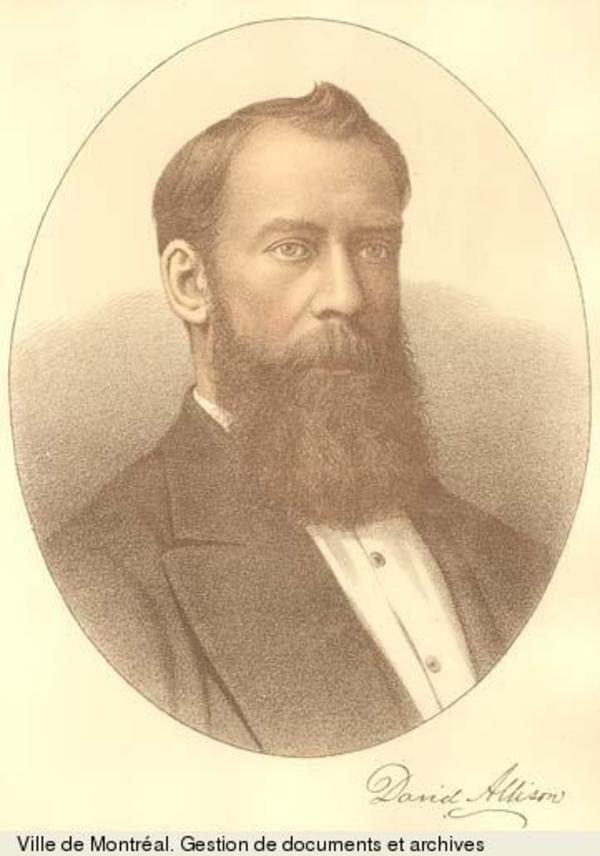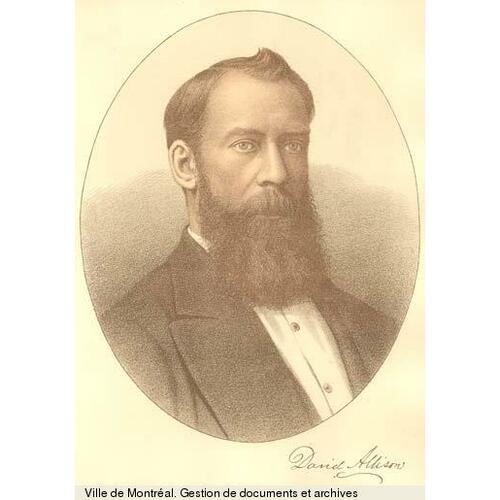
Source: Link
ALLISON, DAVID, professor, educational administrator, and author; b. 3 July 1836 in Newport, N.S., son of James Whidden Allison and Margaret Elder; m. first 18 June 1862 Elizabeth Powell (d. 1898) in Richibucto, N.B., and they had five sons; m. secondly 3 July 1902 Ellen Elizabeth Cummins in Montreal; d. 13 Feb. 1924 in Halifax.
Well connected both socially and politically, David Allison came from an Ulster Scottish family. His father was a substantial farmer and a magistrate who during David’s childhood served a term as Conservative mha for Newport Township. After receiving his early education at a local school and at the Dalhousie Collegiate School in Halifax, David Allison spent four years studying at the Wesleyan Academy in Sackville, N.B., which had been founded by his kinsman Charles Frederick Allison*. As other able Methodist young men from the Maritime colonies had done before him, he went on to Wesleyan University in Middletown, Conn., where he received his ba in 1859. He took an ma from the same institution three years later. By this time Allison was back in Sackville as classics teacher at the academy. He had been principal of the Stanstead Seminary in Lower Canada during 1859–60.
When Mount Allison Wesleyan College was established in Sackville in 1862, Allison immediately became professor of classics, but he also taught political economy, constitutional history, and international law. In 1869 he succeeded Humphrey Pickard* as president of the 21-student college. The nine years of his first term as president were eventful ones for the institution. Although enrolment increased only modestly, the college surmounted, through vigorous fund-raising, the loss of its grant from the New Brunswick government in 1872 and agreed in 1876 to participate with other regional institutions in the confederated, though non-teaching, University of Halifax (which would ultimately fail in 1881). It also awarded, in 1875, a degree of bachelor of science and English literature to Grace Annie Lockhart, who thus became the first woman in the British empire to receive an undergraduate degree. It is unlikely that Allison himself was active in advocating the innovation of women’s undergraduate education; this role seems to have been fulfilled primarily by his faculty colleague James Robert Inch*. Allison’s opinion was that “any woman’s best and highest sphere” was as helpmate to “some good, honest, faithful man,” and he was known on occasion to show publicly his impatience with female student essayists who took a different view. Nevertheless, he also maintained that “any Education that differentiates between the sexes is wrong.”
In November 1877 Allison was appointed superintendent of education for Nova Scotia, although he continued to discharge his Mount Allison duties until succeeded by Inch at the end of the 1877–78 academic year. While qualified for the superintendency by virtue of his educational and administrative experience, he was an attractive candidate to the Liberal government that appointed him for several other reasons. His already demonstrated support for the University of Halifax, an initiative of Premier Philip Carteret Hill*, was one recommendation. At a time of tension between Presbyterians and Roman Catholics, his Methodism promised impartiality, and his Conservative connections precluded the suggestion of a politically motivated appointment. Allison never made any secret of his Conservative leanings, although he endeavoured to avoid public partisanship. Reputedly he had argued against Maritime entry into confederation and had sympathized with the anti-confederate leader in New Brunswick, Albert James Smith*, but if this was indeed his position, he was soon reconciled with Conservative pro-confederates.
As superintendent of education, Allison favoured an academic orientation for the public schools of Nova Scotia and resisted the efforts of those who sought to make public education an instrument of progressivist reform. He was lukewarm towards the legislation of compulsory school attendance, and championed the traditional decentralization of decision-making. In all of these positions, as in his ill-concealed distaste for Prohibition, he struggled with limited success against the reformist tide. The opportunity to return to Mount Allison College in 1891 for a second term as president no doubt came as a relief to him, even though it meant abandoning public education in Nova Scotia to the reformists [see Alexander Howard MacKay]. The ensuing 20 years saw considerable expansion at Mount Allison, but by the time the 75-year-old Allison retired in 1911 he had come to be seen as a revered figure whose grip on matters such as student discipline and university finance was embarrassingly feeble.
In other respects, however, Allison retained a level of vitality that would sustain him through a lengthy retirement. His continuing reputation for impartiality had been shown in his participation in 1908 in a board of conciliation (which also included the political economist Adam Shortt*) that successfully resolved a dispute at Sydney Mines between the Nova Scotia Steel Company Limited and its striking miners. Residing in Halifax, he busied himself by marking provincial examination papers. Allison, who had already compiled an English grammar for Nova Scotia schools, also turned to writing a general history of the province. Historiographically undistinguished but handsomely produced, it was published in 1916.
David Allison was a large man with a booming voice. He enjoyed sports: an avid horse-racer in younger days, in later years he was not above using what was – for a prominent Methodist layman and preacher – risqué language in support of the Mount Allison rugby team. All of these traits led to mixed impressions recorded by contemporaries. For one former student, he was “a very bluff person, rough you know.” For another, his oratory in the classroom – which was matched by his vigour in the pulpit – made him “a magnetic leader and a prince among teachers.” Passionate and impulsive, Allison lacked the more patient and persistent skills of persuasion that might have made him a shrewder advocate of the conservative values he embraced in both education and religion. When old and ill, hearing his wife conversing at the front door with a journalist, he was reported to have summoned up the strength to shout down the stairs, “Tell him I’m a Tory and a Methodist!” Both in content and in delivery, it was apt enough as a self-chosen epitaph.
[David Allison’s career as president of Mount Allison College is documented chiefly in the collections of the Mount Allison Univ. Arch. in Sackville, N.B., although there is no systematic collection of his presidential papers, few of which seem to have survived. Some valuable letters can be found in Mount Allison Univ. Arch., 7508 (B. C. Borden fonds). Official records such as calendars and minutes of governing bodies provide details of institutional developments during Allison’s terms of office. The crucial source for his period as superintendent of education for Nova Scotia is his Annual report (Halifax), 1879–91; indispensable in interpreting this phase of his career is R. N. Henley, “The transformation of common schooling in Nova Scotia, 1877–1896” (phd thesis, Univ. of Toronto, 1997). Allison, along with Clyde Edwin Tuck, is the author of History of Nova Scotia (3v., Halifax, 1916). j.g.r.]
Mount Allison Univ. Arch., 5501 (R. C. Archibald papers); Biog. files, David Allison. Argosy Weekly (Sackville), 29 March 1924. Chignecto Post and Borderer (Sackville), 3 June 1880. Morning Chronicle (Halifax), 14 Feb. 1924. Provincial Wesleyan (Halifax), 1 Aug. 1860. Sydney Daily Post (Sydney, N.S.), 28–30 July, 3–4 Aug. 1908. Wesleyan (Halifax), 3, 10 Aug. 1898. Canadian men and women of the time (Morgan; 1898 and 1912). D. W. Johnson, History of Methodism in Eastern British America . . . ([Sackville], n.d.). The Legislative Assembly of Nova Scotia, 1758–1983: a biographical directory, ed. S. B. Elliott ([Halifax], 1984). L. A. Morrison, The history of the Alison, or Allison family in Europe and America . . . (Boston, Mass., 1893). J. W. O’Brien, A parson reminisces: a mélange of recollections and reflections (Sackville, n.d.). J. G. Reid, Mount Allison University: a history, to 1963 (2v., Toronto, 1984). Benjamin Russell, Autobiography of Benjamin Russell (Halifax, 1932). Standard dict. of Canadian biog. (Roberts and Tunnell).
Cite This Article
John G. Reid, “ALLISON, DAVID,” in Dictionary of Canadian Biography, vol. 15, University of Toronto/Université Laval, 2003–, accessed February 17, 2026, https://www.biographi.ca/en/bio/allison_david_15E.html.
The citation above shows the format for footnotes and endnotes according to the Chicago manual of style (16th edition). Information to be used in other citation formats:
| Permalink: | https://www.biographi.ca/en/bio/allison_david_15E.html |
| Author of Article: | John G. Reid |
| Title of Article: | ALLISON, DAVID |
| Publication Name: | Dictionary of Canadian Biography, vol. 15 |
| Publisher: | University of Toronto/Université Laval |
| Year of publication: | 2005 |
| Year of revision: | 2005 |
| Access Date: | February 17, 2026 |



